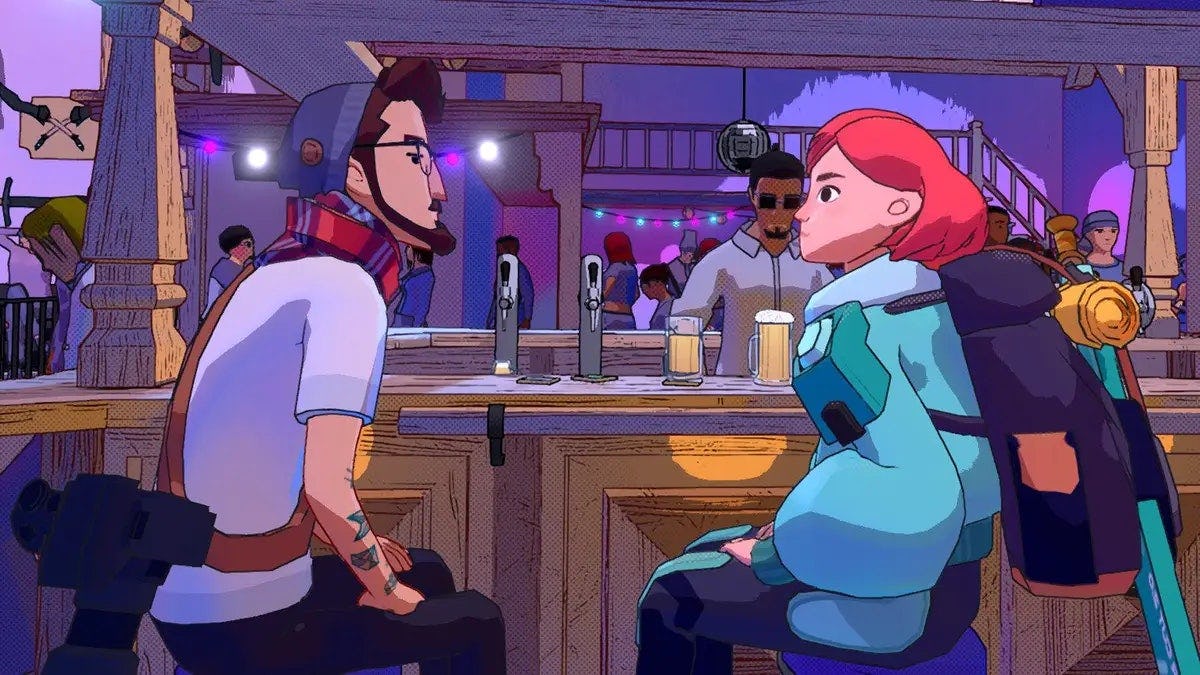
After slowly trudging through the scenic snowy peaks of Kolmstein for the first time, opening hidden chests, and talking up other visiting slayers vacationing in Hinterberg, I finally spot what I’m looking for glistening in the distance: the vaunted Skill Shrine. I jump and scale icy walls and obstacles until the rotating energy source is just steps away. I’m eager to absorb whatever magic lies within, not just for the power trip of learning a new ability, but because I can’t wait to see how developer Microbird Games will incorporate this new ability into Hinterberg’s many dungeons.
Discovery is what drives players in the opening hours of Dungeons of Hinterberg. But even after gaining all the magical abilities in its first 15 hours, it's how the game uses these abilities to get players thinking creatively about solving its classic Zelda-like puzzles and enemy encounters that keep the fun alive. Paired with the game’s addictive Persona-like progression and social mechanics, its colorful cast of quirky locals and visitors, and serene setting, Dungeons of Hinterberg is a cozy must-play in a year full of great games in the popular subgenre.
Interrupting The Rut
Dungeons of Hinterberg is a game about self-discovery. At the start, players are introduced to protagonist Luisa Dorfer, an attorney hoping to break away from the mundanity of life that’s sent her spiraling into a quarter-life crisis most 20-to-30-somethings are familiar with. She finds herself in Hinterberg, a fictional, European alpine village recently imbued with magic. Hinterberg has become a tourist destination known internationally for its homey tranquility, its pristine views… and the 25 monster-filled dungeons visitors can take on to add thrill and excitement to their lives.
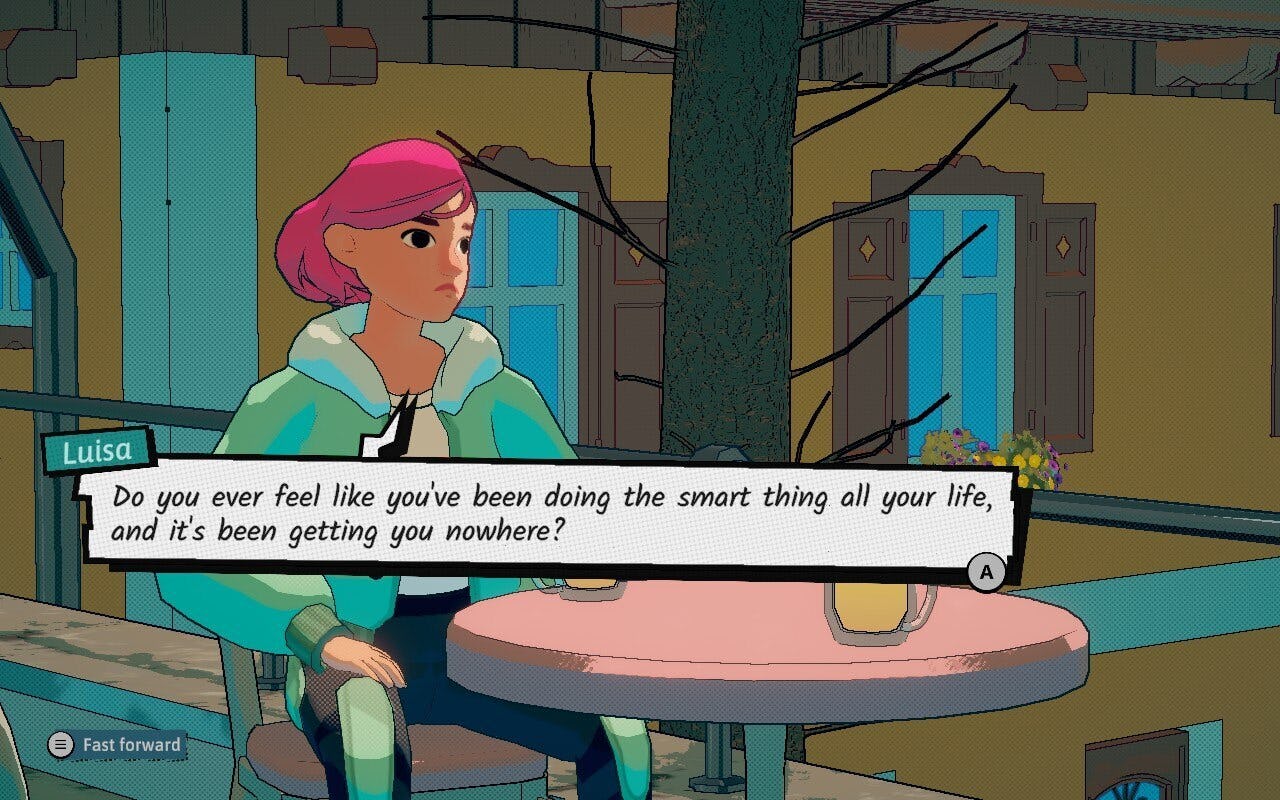
Luisa’s struggles with self-doubt and regret can be a bit on the nose, with references to bad roommates, sweet childhood memories, and unfulfilling career throughout the early hours. Hinterberg mostly relies on these tropes to flesh her out, but as an obvious stand-in for the player, I found her hero’s journey more sincere than cringe.
The game doesn’t shed any new light on topics like corporate greed and corruption, however, so conversations about them tend to come across as ‘baby’s first lecture on social justice.’
As days pass, Luisa becomes embroiled in the local goings-on of the village. There’s a surprising amount of lore regarding how magic has affected this sleepy town and its citizens. As you meet new people, you’ll get a variety of perspectives that tie themes of gentrification, corporate greed, and corruption. The game doesn’t shed any new light on these hot topics, however, so conversations about them tend to come across as “baby’s first lecture on social justice.” But I also understand that getting into the weeds of these serious (and topical) issues risked disrupting Hinterberg’s otherwise easygoing vibe.
The game’s presentation is an absolute joy. Its vibrant colors, varied landscapes, and cel-shaded graphics make it one of the most inviting games I’ve played in years. It’s not doing anything you haven’t seen technically, but taking inspiration from the real-life Austrian village of Hallstatt, as well as creature and monster designs from Austrian folklore makes for a world that feels unlike anything else you can play today.
Enjoy Your Slay
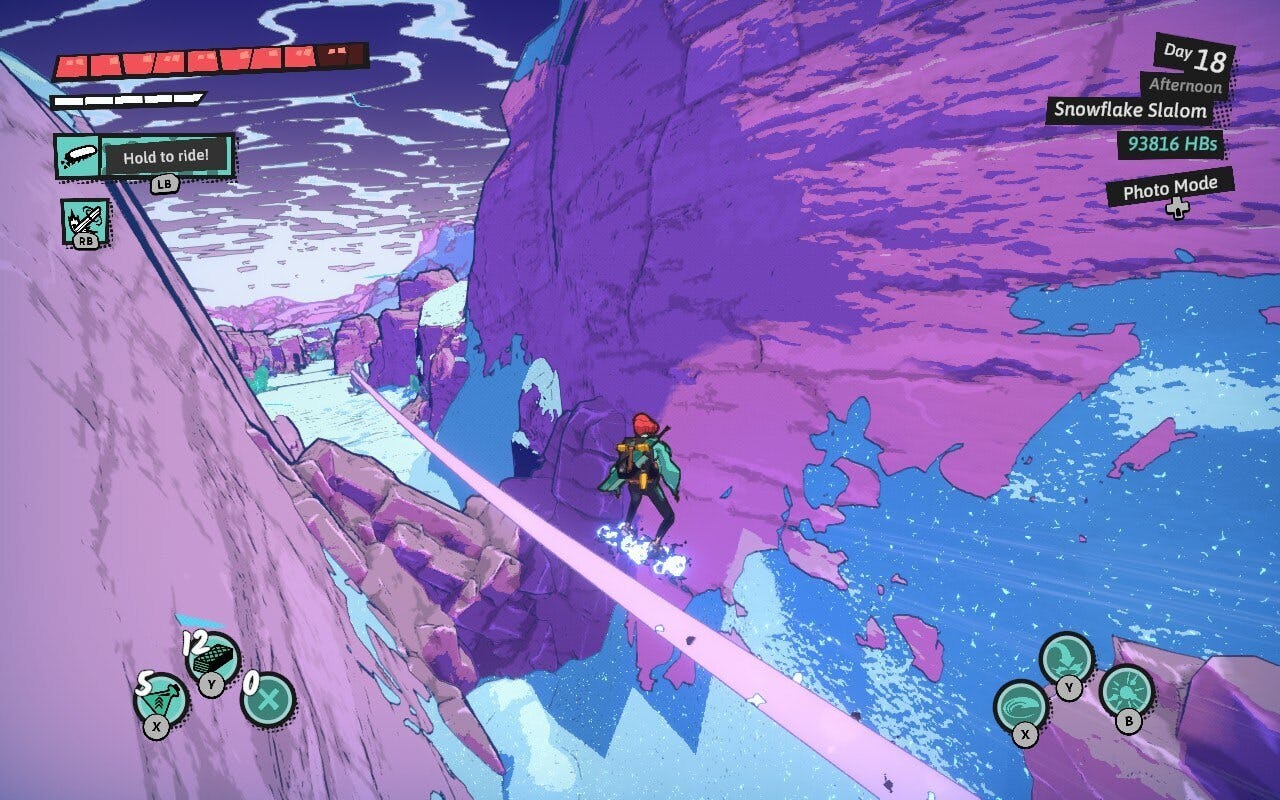
While the presentation is one of a kind, Hinterberg borrows heavily from some of gaming’s heaviest hitters. As the name implies, this is a dungeon crawler. Each of Hinterberg’s five regions has two specific powers players can use, from hook shots and remote bombs to electric projectiles and makeshift tornadoes. Players use these powers alongside their wits, might, and reflexes to complete each dungeon. As a reward, you’ll earn loot and gear to be worn, upgraded, or sold for Hinterbucks in the game’s hub world.
Each of the dungeons is distinct. One will task you with slaying a massive dragon, while another might have you riding minecarts through dank caves. These dungeons don’t have the level of Nintendo’s smile-inducing creativity seen in games like Super Mario Galaxy or last year’s Tears Of The Kingdom, but they're consistently engrossing without being frustrating. The other pillar of Hinterberg’s action is its combat. I found the hack-and-slash gameplay less engaging than the puzzle-solving, though it does improve immensely as you upgrade their armor and unlock special powers called Attack Conduits, and passive abilities called Charms. Mixing and matching the variety of Conduits and Charms you discover in dungeons (or buy from shops) allows you to experiment with your play style.
Persona Of Interest
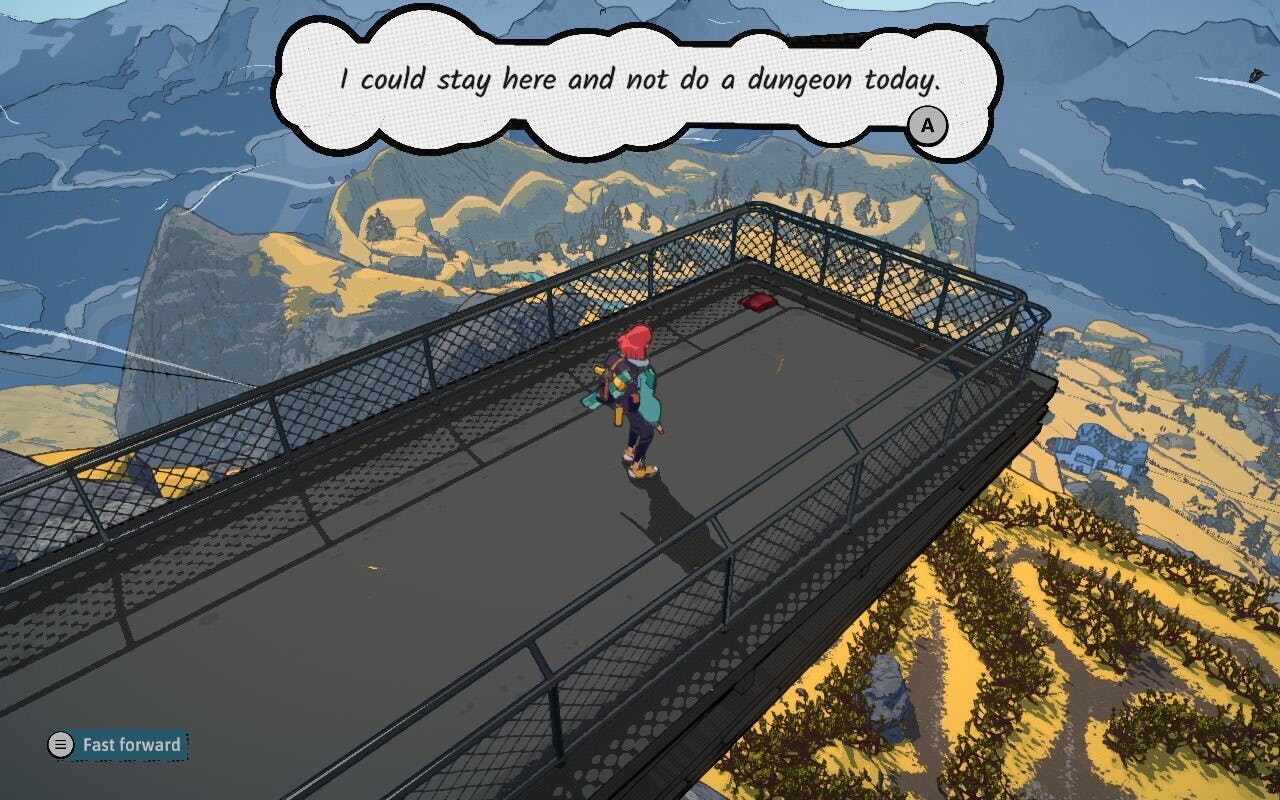
When you’re not solving puzzles and slaying beasts, you’ll spend your days exploring Hinterberg and talking to people. Anyone who’s played the later Persona games will feel right at home here. Days are split into the mornings, where you’ll pick where you want to explore, evenings where you’ll have a chance to prepare for the following day’s dungeons and develop relationships; and nights, where you’ll have some alone time.
The routine is occasionally interrupted by major story beats, but for the most part, this primary loop works well thanks to some clever and genuinely funny character moments. I looked forward to seeing what Travis, the town’s hipster reporter was up to, or cutting it up with the rebellious teenager Thea. Completing side quests for the 16 inhabitants of Hinterberg increases Luisa’s stats, and doles out perks — some more crucial than others. Thankfully, the Hinterberg’s handy log gives you a breakdown of what perks players stand to gain from developing each of these relationships, allowing you to plan for what boons you want for your playthrough. If you want to take a break from intimate hangouts, players can also boost their stats by visiting recreational spots around town like spas, bars, or campfires. While in the wilds of Hinterberg, players can skip the grind of dungeon crawling and find scenic views to improve Luisa as well. If there’s one critique I have for the social half of Dungeons of Hinterberg, it’s the night sections. Players can read, watch TV, or sleep to ensure Luisa’s well-rested, but that’s it. Adding a few more nighttime activities would have been a great way to add variety at the end of each day.
A Picture Perfect Vacation
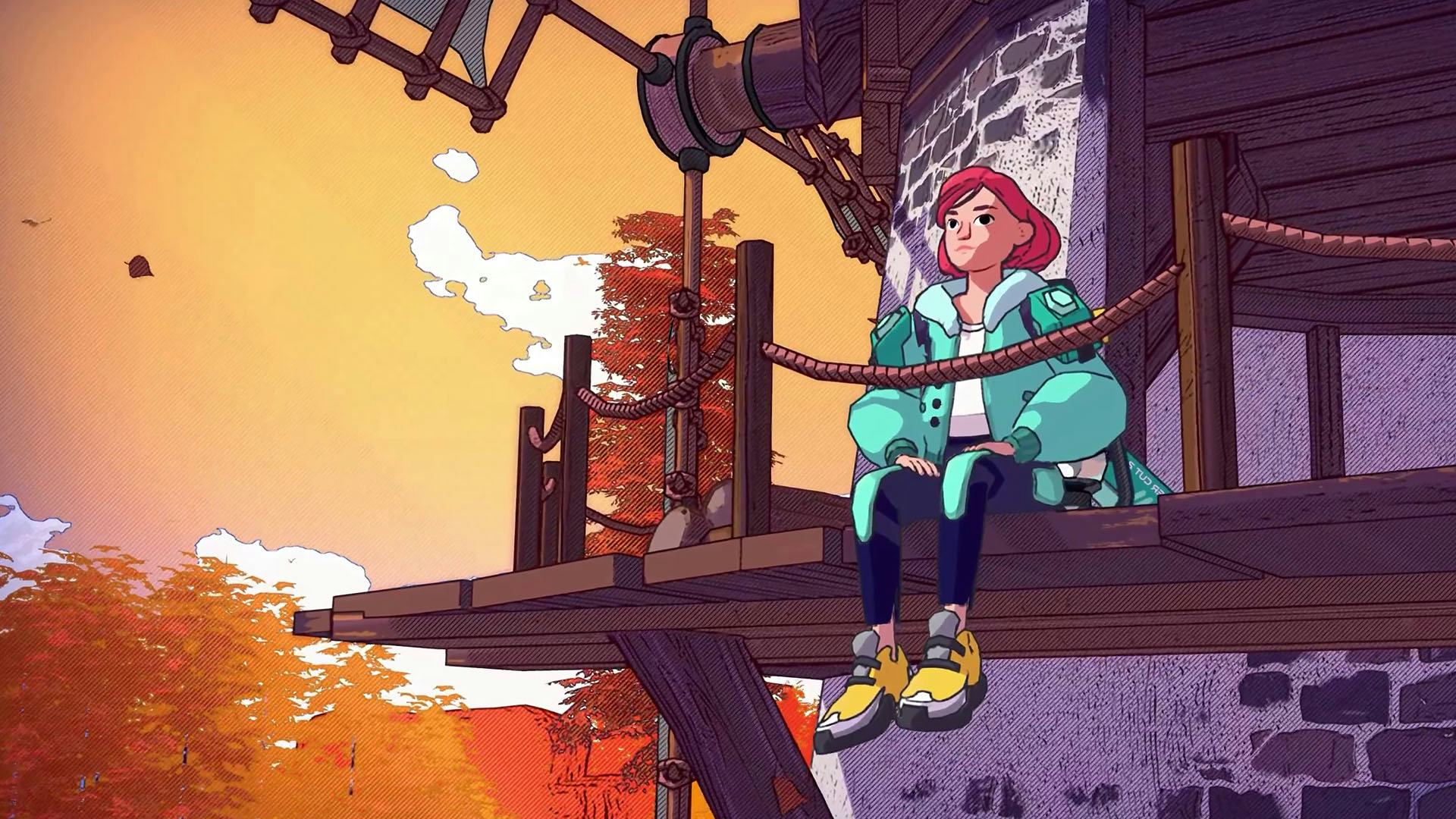
In borrowing so heavily from franchises like Zelda and Persona, Dungeons of Hinterberg also picks up some of their faults. As the game introduces new characters, activities, and mechanics in the opening hours, its pacing can be torturous. It took about 12 hours before Hinterberg granted me all my abilities and the freedom to engage with the world without holding my hand. If you’ve played Persona 5 or Zelda: Twilight Princess, this slow build will feel familiar. And while it doesn’t take away from the total package, it’s a shame that Hinterberg doesn’t try to curb some of those pacing issues. There are also some minor display quality-of-life features that are inexplicably missing from the game. There’s no way to sell old, under-leveled equipment with a button push at stores. This small, nagging issue gets in the way of the game’s otherwise frictionless and inviting tone.
Dungeons of Hinterberg is a gorgeous, sincere, and snuggly little adventure. It doesn’t do anything groundbreaking, but its individual parts come together to create an immensely fun package that feels like a warm cup of tea on a cold dreary day. Fans of the cozy genre owe it to themselves to check this one out. The engaging puzzles and dungeons also warrant a look-in from those who have fuzzy memories of solving the elaborate temples of older 3D Zelda games. Dungeons of Hinterberg is a masterful mix of the modern cozy game and the wondrous sense of adventure of old-school role-playing classics. Spending a few days in this magical, quaint little town is sure to be time well spent.
8/10
Dungeons of Hinterberg launches on July 18 on Xbox Series X and PC.
INVERSE VIDEO GAME REVIEW ETHOS: Every Inverse video game review answers two questions: Is this game worth your time? Are you getting what you pay for? We have no tolerance for endless fetch quests, clunky mechanics, or bugs that dilute the experience. We care deeply about a game’s design, world-building, character arcs, and storytelling come together. Inverse will never punch down, but we aren’t afraid to punch up. We love magic and science-fiction in equal measure, and as much as we love experiencing rich stories and worlds through games, we won’t ignore the real-world context in which those games are made.







